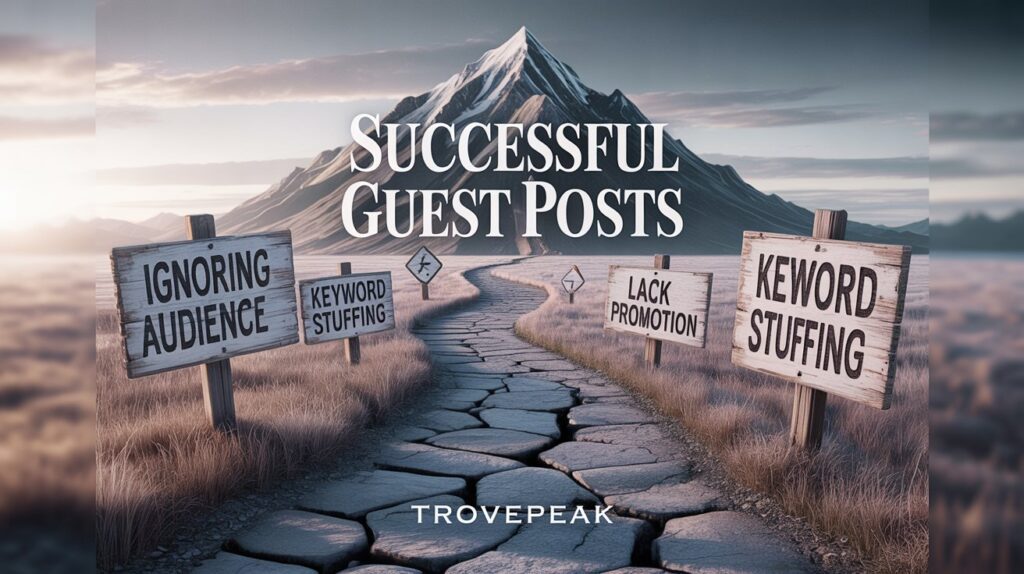Guest posting is one of the most effective ways to gain backlinks, boost your domain authority, and tap into new audiences — but only if you do it right. Unfortunately, many beginner bloggers and even experienced marketers make avoidable common mistakes that instantly send their pitch (or post) to the trash folder.
In this post, we’ll break down the 7 most common guest posting mistakes and exactly how to avoid them. If you’re planning to submit a guest post to our site or any other — read this first.

🔥 Why Guest Posts Get Rejected (Even When They’re Well-Written)
Even if your writing is decent, that doesn’t guarantee approval. Editors receive dozens of guest post pitches every week. One wrong move, and your submission could be ignored completely. By avoiding the common pitfalls below, you dramatically increase your chances of getting published.
❌ Mistake #1: Sending Generic Pitches
“Dear Sir/Madam, I want to contribute an article to your blog…”
This is the fastest way to get ignored.
✅ What to do instead:
- Personalize the email
- Mention the editor’s name
- Reference a recent blog post
- Show that you’ve read and understood their content
🔗 Want to learn how to craft a killer pitch? Check out this guide from HubSpot
❌ Mistake #2: Ignoring the Blog’s Guidelines
Most blogs clearly list their guest posting guidelines, but many writers don’t even read them — or worse, ignore them entirely.
✅ What to do instead:
- Look for the “Write for Us” or “Guest Post” page
- Follow formatting instructions, word count, topic relevance
- Submit the post in the requested format (Google Doc, .docx, etc.)
Even blogs like Search Engine Journal reject pitches that don’t follow simple rules.
❌ Mistake #3: Writing for Yourself, Not Their Audience
Some writers treat guest posts like personal blogs — overly promotional, off-topic, or irrelevant to the host’s audience.
✅ What to do instead:
- Understand who the readers are
- Tailor your tone and content to match the site’s brand
- Focus on adding value, not just dropping backlinks
❌ Mistake #4: Keyword Stuffing
You want to rank, sure. But cramming your article with keywords like “guest post,” “SEO,” or “blogging tips” in every other sentence will backfire.
✅ What to do instead:
- Use keywords naturally (2–3% keyword density max)
- Focus on readability and helpfulness
- Let keywords flow with the content, not force them
❌ Mistake #5: Over-Promoting Yourself
A guest post is not a product pitch. Sites want helpful, informational content — not a 1,000-word ad.
✅ What to do instead:
- Add your link in the bio or contextually (if allowed)
- Focus the post on solving a problem, not selling a service
- Keep self-promotion subtle and relevant
❌ Mistake #6: Poor Formatting
Large blocks of text, inconsistent headings, or no bullet points = instant rejection.
✅ What to do instead:
- Use headings (H2, H3) for structure
- Break long paragraphs into smaller chunks
- Use bullets, numbered lists, and images where helpful
❌ Mistake #7: Submitting AI-Generated Content Without Editing
Many editors can now spot raw AI-generated articles. If it sounds robotic or generic, it likely won’t get accepted.
✅ What to do instead:
- Use AI tools to assist, not replace your writing
- Humanize the content: vary sentence length, add real examples, speak directly to the reader
- Read it aloud before submitting — if it sounds unnatural, revise it
🚀 Final Thoughts: Write for the Reader First
Getting a guest post approved isn’t luck — it’s strategy. If you:
- Follow the blog’s guidelines
- Personalize your pitch
- Provide value and helpful content
- Write with the reader in mind — not just SEO…
You’ll stand out in the editor’s inbox and earn a quality backlink.
📝 Want to Submit a Guest Post to Us?
We’re currently accepting guest post submissions on blogging, SEO, digital marketing, and content strategies.
- Minimum 500 words
- No AI-only content
- One dofollow backlink allowed
- Helpful, original, well-formatted writing
👉 View Our Guest Post Plans and Conditions Here
👉 Submit Your Guest Post
